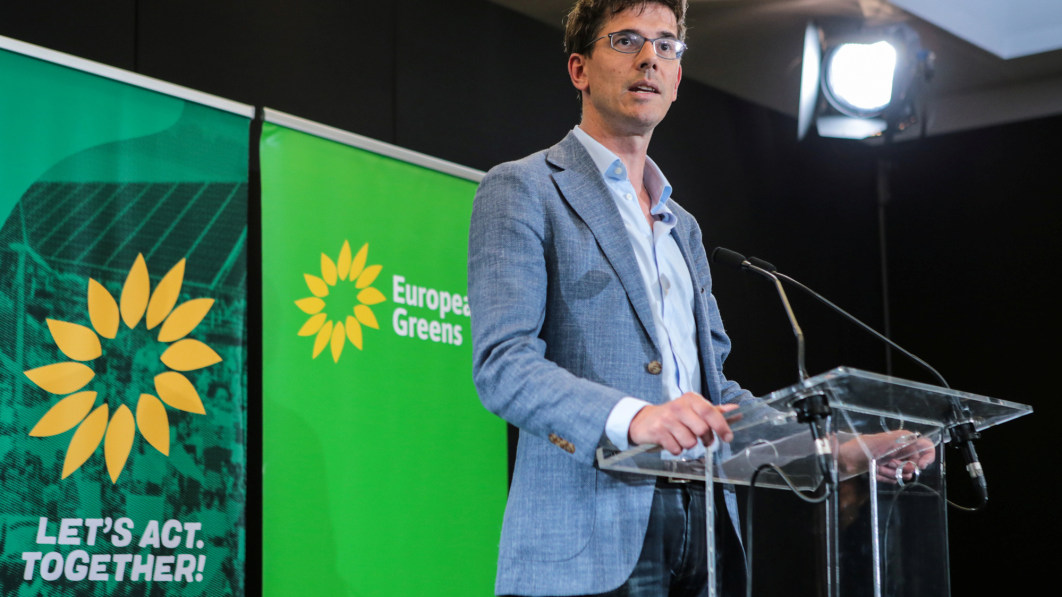BRUSSELS/DRESDEN, Germany — Millions of young people took to the streets across Europe in 2019 demanding action to fight climate change, helping Green parties secure their best ever EU election results and giving them influence over climate policies Brussels has passed since.
That looks set to change. Polls suggest Greens will perform worse than any other political grouping in June’s EU election, which will form the next 720-member European Parliament. They look set to lose nearly a third of their current 72 EU lawmakers.
“It was of course a great feeling in 2019. People all loved us and the climate was the number one topic,” Green EU lawmaker Anna Cavazzini told Reuters.
“That’s a little different now, of course. Overall, I would say there is a bit of a social backlash against climate protection.”
Instead of hordes of young supporters in the streets, some Green candidates running this year have reported physical attacks and vandalism on the campaign trail.
Fewer Greens in the next European Parliament will affect EU climate policy for the next five years, as the bloc’s “Green Deal” moves into a politically sensitive phase in which the economic impact of Green goals will become more visible.
“The elections will be about the future of the Green Deal,” said Bas Eickhout, the Dutch EU lawmaker co-leading the Greens into the EU election.
COMPETING CONCERNS
Analysts and EU lawmakers from across the political spectrum attribute the Greens’ expected decline to factors ranging from voters’ reaction to a cost of living crisis, anxiety over issues like migration — which has boosted support for far-right parties — and anger over unpopular moves by Green politicians in national governments.
“The big topics now are competitiveness, security, social issues, immigration, and these are topics on which the Greens struggle a little bit more,” said Davide Ferrari, head of research at research platform EU Matrix.
Climate change has accelerated since the last EU election, pushing the world this year to cap its first 12-month spell of temperatures more than 1.5C above pre-industrial times. Polls show most European voters — around three-quarters — remain highly concerned.
But other worries have taken centre stage.
In an Ipsos poll of 26,000 Europeans published in March by Euronews, respondents ranked climate change as only the sixth priority issue for the EU to tackle — behind inflation, illegal immigration and unemployment.
In Germany, whose 25 Green members of the European Parliament far outnumber those of any other EU country, the party’s role in government has also knocked their popularity.
A stuttering economy and unpopular policies including a draft plan to phase out fossil fuel boilers pushed German satisfaction with their government to a record low of 27% in January.
Approval ratings for Economy and Climate Minister Robert Habeck, Europe’s most senior Green politician, almost halved between June 2022 and May 2023, a YouGov survey showed.
“The German economy is now entering difficult waters,” said Stefan Marschall, a political scientist at the University of Duesseldorf.
“As soon as environmental policy is designed in concrete terms, then it becomes clear that this is something that also costs money … that leads to people turning away,” he added.
FIGHTING BACK
Polls suggest gains in next month’s election for right-wing and far-right parties that could erode the next EU assembly’s ability to pass ambitious new climate policies.
Major climate decisions for the next EU Parliament include a decision on the EU’s legally binding 2040 climate target. So far, the EU has stuck to a science-aligned 90% emissions cut proposal under pressure from the Greens.
The EU has already passed more than two dozen emissions-cutting policies into law, including renewable energy targets and a 2035 ban on new CO2-emitting cars.
Those policies can’t be revoked, but many have a legal “review” scheduled in the next few years, which some EU officials suggest a more climate-skeptical parliament could use to add loopholes or undo parts of the laws, slowing Europe’s Green transition.
With two and half weeks until EU citizens head to the polls, the Greens are highlighting what they see as the dangers posed by the far right.
Sybren Kooistra, who manages the EU Greens’ election campaign strategy, said that in the last EU election, climate change was the top issue, but not any more.
“It’s not working with the same fire and emotion as when we talk about freedom and the far right,” Kooistra told Reuters. “This is more about fighting the far right.”
Greens on the campaign trail today emphasise their platform includes social fairness and support for European industries to stay competitive, while also attacking the far right.
German climate activist Luisa Neubauer, a prominent figure in the Fridays For Future youth movement that held mass climate protests ahead of the 2019 election, said other parties were paying more attention to climate, but the Greens still set the bar.
“If the Green Party in the European Parliament compromises on climate, on environment, they lower the bar for everyone else,” Neubauer said.
Speaking to Reuters during an afternoon of door-to-door campaigning in the eastern city of Dresden this month, lawmaker Cavazzini described the Greens as also the antidote to the far right.
“They hate everything we want. We also find everything they want to be terrible,” she said.

